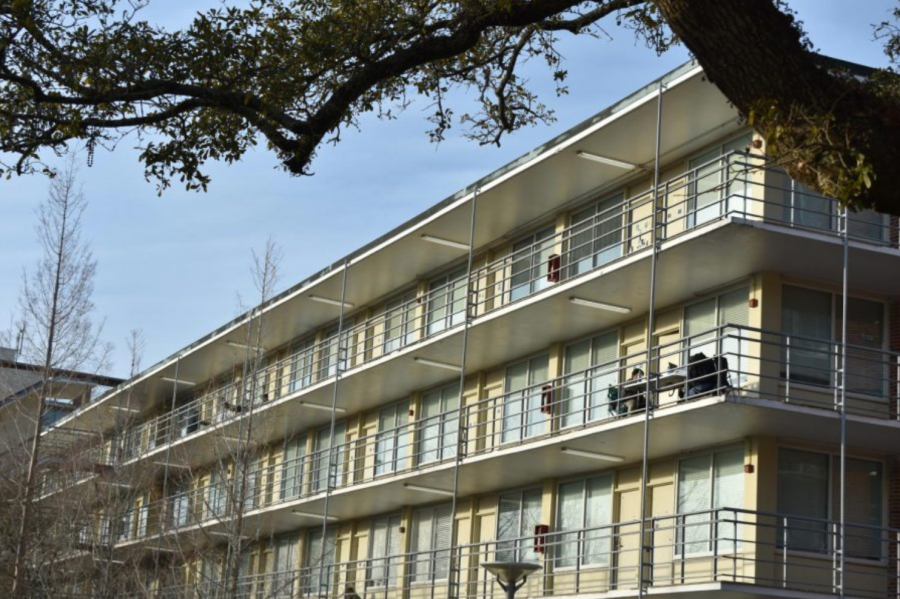OPINION | Further accommodations needed for students with disabilities
April 28, 2021

The American Disabilities Act mandates that colleges and universities provide accommodations to students with disabilities, which includes installing elevators, button-operated automatic doors and wheelchair-accessible ramps. In this vein, Tulane University “strives to create intentional, comfortable, and supportive living communities that account for the needs of all students,” according to the Goldman Center for Student Accessibility website. However, the atmosphere on campus does not conform to the stated objective, and further work is needed to provide for disabled students.
Although the ADA advocates for the interests of disabled students, an NBC News report suggests it is in need of revision, pointing to an important caveat in the ADA’s mandate: “If an institution can prove that making the accommodations and modifications would constitute an undue financial or administrative burden, the alterations aren’t required.” While Tulane should make all buildings accessible to disabled persons, making such modifications to historic buildings comes at an aesthetic and monetary cost, allowing the administration to circumvent a wholesale reformation of university facilities.
Residence halls are an area of particular concern on college campuses for students with disabilities, given that these buildings are designed to maximize the number of students who can reside there, often resulting in reduced space. On Tulane’s campus, there are three residence halls — Irby, Phelps and Josephine Louise Residence Halls— that are not outfitted to accommodate students with disabilities. Disabled students have complained about fitting in bathroom showers, as well as utilizing elevators and automatic doors.
If students require special accommodations, the Special Housing Accommodations portal provides an avenue for them to seek alternative housing. Although it is good that disabled students will have a place to reside that is outfitted to their needs, the practice of relocating disabled students to the select residence halls that can accommodate their needs raises a concern. That is, centralizing students with disabilities in a select number of residence halls could have the devastating impact of alienating them from their abled peers, shielding non-disabled students from confronting the needs of disabled students.
Likewise, other locations on and around campus present challenges to students with disabilities, such as the steep ramp leading to The Commons. This incline can prove difficult for those requiring a wheelchair, crutches or other mobility tools to ascend. While the steepness of this incline does lend to the aesthetic value of The Commons — a building whose geometric, modern design is replete with sharp edges — it is clear that pragmatic concerns, such as being accessible to disabled students, must be prioritized.
It is important that students recognize not just physical disabilities but also mental impairments. Accommodations for students who experience difficulties with concentration amidst minor-to-severe environmental distraction are not addressed in the context of residence halls. Tulane housing policy states that “students are not granted housing accommodations for learning and/or attention disabilities.” This provision constitutes a blatant discriminatination against those suffering from education-hindering disabilities, given that a large portion of students prefer to conduct their academic studies and coursework in the comfort of their own residence. Hence, Tulane should include such disabilities when assigning residence hall placements, providing an option for those in need of quiet work conditions.
The Goldman Center has been a vital resource for students with disabilities, providing, among other things, a quiet space and extended time to students with documented accommodations when taking their exams. However, students who opt to utilize these accommodations often elicit the resentment of their peers, who view such accommodations as an unfair advantage.
Another concern stems from the degree to which professors accommodate students’ disabilities. Course syllabi contain an obligatory ADA provision, prompting students to contact the Goldman Center if academic accommodations are needed. However, the extent to which professors understand the needs of students with disabilities is questionable.
In the vein of adjusting social attitudes toward students with disabilities, Patrick Randolph, who has served as the director of the Goldman Center since 2009, said: “I haven’t been able to get the traction here at Tulane to be the leading organization that we claim to be.” The ADA is in need of revision, closing existing loopholes in the path of reform and requiring the implementation of more robust measures on college campuses to accommodate those with disabilities.
Tulane officials should not just twiddle their thumbs in the meantime. Rather, they should take the lead in updating campus facilities to reflect a more accommodating environment, starting with improving common areas within residence halls and making buildings across campus more accessible. It is imperative that Tulane fosters an environment that accommodates those living with disabilities, beyond making minimal accommodations, to create an accessible learning and living environment.









Bill Renton • May 14, 2021 at 7:45 am
Mr Schultz has identified and exposed a travesty for Tulane’s disabled students. Life is not always easy and accessible for people with physical disabilities and those with learning challenges. The University would do well to recognize and address these shortcomings in their program. Congratulations to Zachary Schultz for his work to shed light on this important issue.